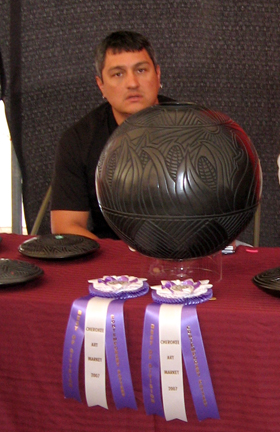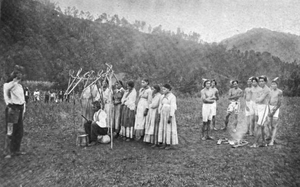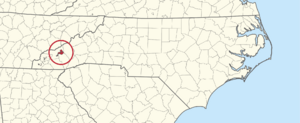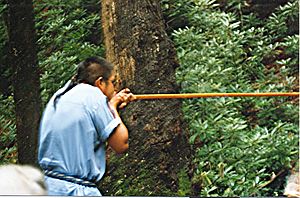Eastern Band of Cherokee Indians facts for kids
Quick facts for kids
Eastern Band of Cherokee Indians
|
||
|---|---|---|
|
Domestic dependent nation
|
||
|
||
| U.S. Recognition | 1868 | |
| Qualla Boundary | 1876 | |
| Incorporation | March 11, 1889 | |
| Capital | Cherokee | |
| Government | ||
| • Type | Tribal Council | |
| Population | ||
| • Total | 16,000+ | |
| Demonym(s) | Cherokee | |
| Website | https://ebci.com/ | |
The Eastern Band of Cherokee Indians (EBCI) is a Native American tribe. They are officially recognized by the United States government. Their home is in western North Carolina. The tribe's name in the Cherokee language is ᏣᎳᎩᏱ ᏕᏣᏓᏂᎸᎩ (Tsalagiyi Detsadanilvgi).
The EBCI are descendants of about 800 to 1,000 Cherokee people. These ancestors stayed in the Eastern United States. This was after the U.S. military forced most Cherokees to move west. This forced move, known as the Trail of Tears, happened in the late 1830s. The Cherokees who stayed had to give up their tribal citizenship. They became U.S. citizens. Later, in the 1900s, they regained their tribal rights.
The history of the Eastern Band is closely tied to the Qualla Boundary. This is a special land area that was once part of their original territory. When the tribe reorganized, they had to buy this land back. The EBCI also owns other lands nearby. Their main office is in Cherokee, North Carolina. This community is located within the Qualla Boundary. It is south of the Great Smoky Mountains National Park.
The Eastern Band of Cherokee Indians is one of three federally recognized Cherokee tribes. The other two are the Cherokee Nation and the United Keetoowah Band of Cherokee Indians. Both of these tribes are based in Oklahoma.
Contents
History of the Eastern Band
The members of the Eastern Band are mostly descendants of about 800 Cherokees. These people lived along the Oconaluftee River. They were not forced to leave their homes during the Trail of Tears. This tragic event moved many Cherokees to Indian Territory (now Oklahoma).
A leader named Yonaguska helped his people avoid removal. He worked with his adopted son, William Holland Thomas. The Eastern Band of Cherokee Indians has kept many of their traditional tribal ways. Many important Cherokee historians are part of this tribe.
Another Cherokee leader, Tsali, also resisted the removal. He stayed in the traditional Cherokee lands. He and a small group tried to stop the United States Army. Tsali was eventually captured. He was executed by the U.S. government. This was done in exchange for the lives of his small group. They were allowed to stay in their homeland. However, they had to give up their Cherokee tribal citizenship. They became U.S. citizens.
Their descendants later reorganized in the 1900s. They gained official recognition as a tribe. They bought back land in the Qualla Boundary. This land was part of their traditional territory. It had been given to the U.S. government earlier.
The Museum of the Cherokee Indian is in Cherokee, North Carolina. It has many old items and exhibits. These show the history and culture of the Cherokee people. You can see things from ancient times. There are also items from the 16th and 17th centuries. The Qualla Arts and Crafts Mutual is also nearby. It sells traditional crafts made by tribal members. It was started in 1946. It is the oldest Native American crafts cooperative in the country.
Language and Culture Today
Many Christian churches are located within the Qualla Boundary. Some traditional Cherokee religious practices have mixed with newer ideas. This happened because different groups of Cherokees lived separately. However, many traditional dances and ceremonies are still performed by the Eastern Band.
The Eastern Band started a language immersion program. This program helps young people learn the Cherokee language. In 2007, they began requiring all high school seniors to speak the tribal language. About 900 people in the Qualla Boundary speak Cherokee. Most of these speakers are over 50 years old.
The Qualla Boundary Land
The Eastern Cherokee Indian Nation Land is officially called the Qualla Boundary. It is in western North Carolina. It is just south of Great Smoky Mountains National Park. The main part of this land is in Swain County and Jackson County. There are also smaller parts in Cherokee and Graham counties. A small piece also extends into Haywood County. The total land area is about 82.5 square miles (213.9 square kilometers). In 2000, about 8,092 people lived there.
The Qualla Boundary is not a typical reservation. It is a land trust managed by the Bureau of Indian Affairs. The tribe bought this land in the 1870s. It was then placed under federal protection. This means the government did not create it as a reservation. Individual tribal members can buy, own, and sell land within the Qualla Boundary.
This land is a small part of the original Cherokee homeland. That homeland once covered a large area. It stretched from western Virginia, North and South Carolina, to parts of Tennessee and Alabama. In the 1800s, the Cherokee people had to buy back their own land. This was after the U.S. government took it through treaties.
Today, the tribe gets most of its money from several sources. These include federal and state funds, tourism, and the Harrah's Cherokee casino. The casino was opened in the early 1990s. Money from the casino helps the tribe grow its economy. It also supports tribal welfare and cultural programs. These include the language program and historical preservation.
Fun Things to Do
The area around the Qualla Boundary is great for tourism. There are many campgrounds, trails, and river adventures. You can go mountain biking, fishing, or golfing. There are also spas and the Great Smoky Mountains National Park. The Blue Ridge Parkway is nearby.
Other attractions include the Unto These Hills Outdoor Historical Drama. You can also visit the Oconaluftee Indian Village. The Cherokee Botanical Garden and Nature Trail is a nice place to explore. The Museum of the Cherokee People teaches about Cherokee history. There are also zoos, restaurants, and shops. These shops sell beautiful traditional art from places like Qualla Arts and Crafts Mutual.
Gaming and the Tribe's Economy
In 1988, the U.S. Congress passed a law. It allowed federally recognized tribes to open casinos on their land. The first major casino in North Carolina, Harrah's Cherokee, opened on the Qualla Boundary in 1997. This casino was a partnership with Caesars Entertainment.
The casino has brought many economic benefits to the tribe. Thousands of people visit Harrah's each year. A large part of the casino's profits goes to the Cherokee Preservation Fund. This fund supports projects that are not related to gambling. It helps protect the environment and preserve Cherokee culture. Other profits help improve healthcare, education, and housing for the tribe.
In 2011, a new agreement allowed live table games at the casino. This agreement also gave the tribe special rights to offer these games in western North Carolina. In 2015, the tribe opened a second casino, Harrah's Cherokee Valley River, in Murphy, North Carolina. In 2019, sports betting and horse racing wagering were allowed on tribal lands.
Beyond the Qualla Boundary
Protecting Sacred Lands
Since the late 1900s, the tribe has bought back important sacred sites. These include Nikwasi Mound (bought in 2019) and Cowee (bought in 2007). They also acquired Kituwah (bought in 1996) and Tallulah (bought in 1996) mounds. These mounds are ancient earthworks. They are believed to be over 1,000 years old. In 2020, more land was acquired that includes the Watauga Mound.
The EBCI is working with local groups and universities. They are developing the "Nikwasi Trail." This trail highlights important Cherokee cultural sites along the Little Tennessee River. This project helps people learn about the tribe's history and connection to the land.
The EBCI has also been working with universities since 2011. This project helps them learn more about the ancient mounds and towns. They use tribal knowledge and modern technology. This helps them keep a better record of the mounds. To protect these important sites from harm, the tribe keeps the exact locations of most mounds secret.
New Businesses for the Tribe
The tribe has created new companies to grow its economy beyond gaming.
- Kituwah LLC was started in 2019. It aims to create or buy businesses. These include property development, entertainment, and professional services. Kituwah bought land in Tennessee. It has opened a large store there. It is also discussing a partnership for a historical theme park. Kituwah also manages Cherokee Cinemas. In 2020, it bought a company that builds modular homes.
- EBCI Holdings, LLC was formed in 2020. Its goal is to expand the tribe's gaming and hospitality businesses. Both Harrah's Cherokee casinos are now part of EBCI Holdings. In 2021, they bought their first casino outside North Carolina. In 2022, EBCI Holdings announced a joint project with Caesars Entertainment. They are developing a new casino in Virginia. In late 2023, they also opened a racing and gaming facility in Kentucky.
How the Tribe is Governed
To be a member of the EBCI, a person must have a direct ancestor listed on the 1924 Baker Roll. They also need to meet a certain blood quantum requirement. This means they must have at least 1/16 Eastern Cherokee blood.
The government of the EBCI has three parts:
- Executive Branch: This includes the principal chief and vice-chief. They are elected for four-year terms. Their job is to represent the tribe. The principal chief can also veto (reject) laws passed by the Tribal Council. They also appoint people to various government positions.
- Legislative Branch: This is the Tribal Council. It has 12 members. Two representatives are elected from each community. They make laws and hold hearings. They also approve land transfers among tribal members. The Tribal Council can override a chief's veto with a two-thirds vote. Members are elected for two-year terms. They work on committees for planning, business, education, and more.
- Judicial Branch: This is the tribal court system. It has a supreme court and a trial court. There are also special courts, like a juvenile court. Judges are nominated by the principal chief and approved by the Tribal Council. They serve terms of four or six years.
Notable People from the Eastern Band
- Goingback Chiltoskey (1907–2000), a woodcarver and teacher.
- Amanda Crowe (1928–2004), a sculptor and teacher.
- Joyce Dugan (born 1952), an educator and the first woman elected as principal chief.
- Charles George (1932–1952), a recipient of the Medal of Honor.
- Edwin George (1934–2022), a folk artist and mural painter.
- Shan Goshorn (1957–2018), a visual artist.
- Myrtle Driver Johnson (1944–), a Beloved Woman and translator.
- Will West Long (1869–1947), a Cherokee mask maker and cultural historian.
- Henry McClain Owl (1895–1980), an educator, activist, and historian.
- Nimrod Jarrett Smith (1837–1893), a Principal Chief.
- Richard Sneed (born 1967), a Principal Chief.
- Lottie Queen Stamper (1907–1987), a basket maker and teacher.
- Amanda Swimmer (1921–2018), a potter and Beloved Woman.
- William Holland Thomas (1805–1893), a Principal Chief.
- Maggie Axe Wachacha (1892–1993), a tribal council clerk and Beloved Woman.
- Jeremiah Wolfe (1924–2018), a Cherokee stone carver, storyteller, and Beloved Man.
See also
- Cherokee One Feather, the tribe's newspaper.
- Stickball (Native American), a traditional sport.
- Cherokee Preservation Foundation, a group that supports Cherokee culture and environment.
- New Kituwah Academy, a school focused on Cherokee language and culture.







